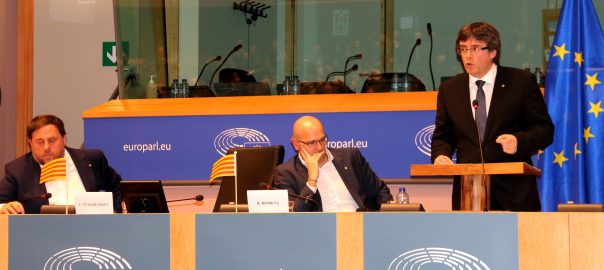25.01.2017 - 13:47
|
Actualització: 25.01.2017 - 13:54
It is an old journalist habit: when big things happen, important things, I like to take a step back for a second; the time it takes to search for a small detail, perhaps not very visible, or overlooked, that helps me make sense of events and explain them.
Many important things took place yesterday in Brussels, but when Vilaweb editor-in-chief Josep Casulleras (you can read his excellent report on the hearing here) mentioned that László Tőkés was in the room, I knew I had found the detail that would explain the transcendence of what was happening.
László Tőkés is a Hungarian MEP who was born in Romania, a member of the large Hungarian ethnic minority in that country. Today, ideologically speaking, I have little in common with him. He is now an MEP with the People’s Party. What he is today, however, does not make me forget who he once was. Revolutions, I realize, are never the work of a single man, and nevertheless we must remember that Tőkés was the one who started the uprising in Romania that ended up overthrowing Ceausescu. And I remember him, from that time, as a real hero.
The Rumanian uprising started in Timisoara, and Tőkés was its main protagonist. It all began in December 1989, when the government sought to remove him from the church where he was a priest, because he had spoken openly against the regime, and also in retaliation for an interview—I think it was on television, but it might have been the radio—that he had given in Hungary. He was arrested and charged with disobeying the constitution and of inciting ethnic hatred. That detention ignited the spark that Romania had been waiting for.
I interviewed him many years ago. Neither Romania nor Hungary were part of the European Union back then. He was a Romanian citizen but he saw Hungary as his homeland, and he dreamed that one day centuries of confrontation over Transylvania would give way to a common European destiny, to a space where he could reconcile the nation to which he felt he belonged with the citizenship that politics forced him to have. It was not an aspiration that was easy to even imagine, but after having lived through everything he had, nothing could seem impossible.
I lost track of him for years, until one day I learned he had been elected Vice-President of the European Parliament. And on that day I tried to imagine what this priest must have been thinking, a man who had maintained that nothing was impossible, but who surely knew how difficult and improbable the road he had travelled was. For the route separating Brussels from the flat where, surrounded by friends and neighbours, he resisted the brutal pressure exerted by the Securitate, the country’s secret police, is certainly a forbidding path, which in the end goes to show that in Europe everything is possible. And that there is no regime, no state, nor government that can forever impede popular will or remove and obliterate the dreams of the people.
I suppose that was why László Tőkés yesterday defied the Spanish Partido Popular, his party mates, and chose to ignore the pathetic letter of Esteban González Pons, PP MEP and spokesman, calling to boycott a hearing with top Catalan politicians. Instead, he joined the large group of MEPs who gathered to learn firsthand about Puigdemont, Junqueras and Romeva’s vision for a new European dream, as his had once been: the story of a movement, ours, that also knows that, in Europe, nothing is simple but everything is possible.


